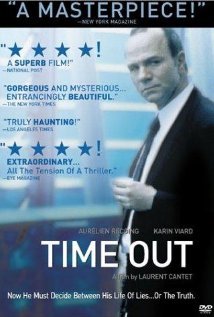“Strong Art, Weak Message, but Oh So French!”

| None | Light | Moderate | Heavy | |
|---|---|---|---|---|
| Language | ||||
| Violence | ||||
| Sex | ||||
| Nudity |
What You Need To Know:
TIME OUT is a powerful, but overlong, glimpse into the psyche of a man who has lost his job, dignity and meaning, and struggles to regain it by constructing a life that doesn’t exist. Vincent is a middle-class, working father of two. The story opens with Vincent literally living in his car, pretending to be occupied with business meetings that last long into the night. Vincent is doing this to keep his wife and family from knowing he has been fired from his job. At a school fair, word gets out that he is no longer at his old company. Instead of leveling with his friends and family, Vincent begins a deception leading to an elaborate fraud. Vincent’s lie puts loved ones at risk and compromises his integrity. By the end of the movie, he rejects his deceptive life, but for no real reason other than being tired of it and regretting the risk he has caused his friends and family.
TIME OUT evokes the “God-shaped hole” in every man that cannot be satisfied with money or importance, but it is much better at asking the question than it is able to provide the answer.
Content:
(Ro, B, L, S, NN, D, M) Romantic worldview with protagonist controlled by emotions for most of movie, taking actions that hurt his family and friends; but love for and providing for family are shown as important values and family relationships and friendships are valued; six obscenities; no violence; married couple shown in bed after sex with husband’s nude upper body and wife’s nude back only and wife playfully “assesses” husband’s body without being graphic; several main characters chain smoke; and, husband deceives his family & friends, taking money from both fraudulently.
More Detail:
TIME OUT is a beautiful looking and sometimes powerful glimpse into the psyche of a man who has lost his job, dignity, and meaning, and struggles to regain it by constructing a life that doesn’t exist. Vincent (Aurelien Recoing) is a middle-class, working father of two. His wife Muriel (Karin Viard) is a teacher and devoted mother. The family lives simply but comfortably in an apartment in Grenoble and has a close relationship with Vincent’s more successful father.
TIME OUT opens with Vincent literally living in his car – taking phone calls from his wife on his cell phone, eating fast food from convenience stores, driving aimlessly, and pretending to be occupied with business meetings that last long into the night. Vincent is doing this to keep his wife and family from knowing that he has been fired from his job for his loss of focus, and in fact for his penchant for driving around unnecessarily during business calls.
At a school fair attended by friends and Vincent’s parents, word gets out that he is no longer at his old company. Instead of leveling with his friends and family, Vincent begins a deception that leads to an elaborate fraud. He pretends to be pursuing, and then to be hired by the United Nations in Switzerland. He visits their offices and picks up literature, which he carefully studies so he can convince everyone that he is indeed working in International Commerce for the UN.
TIME OUT is a gorgeously artistic film full of cold, gray and bleak, white landscapes, green lit offices, and much of the camera work shot through glass. The audience sees the roads Vincent drives through his windshield, sees him asleep through the windows of his van, and sees his family and office workers silhouetted in the windows of their apartments and offices, looking isolated and separated from the world and from each other.
Vincent loves his family but has lost himself, and struggles to create an image and purpose for his life that puts friends and family at risk and compromises his integrity and honesty. This tension becomes too much for Vincent, and by the end of the movie (which runs far too long and begins to counteract the audience’s sympathy for Vincent), he rejects his deceptive life, but for no real reason other than being tired of it and regretting the risk he has caused his friends.
TIME OUT evokes the “God-shaped hole” in every man that cannot be satisfied with money or importance, but like many good modern films, it is much better at asking the question than it is able to provide the answer. This keeps a good, but overlong, effort from being a good or great movie.


 - Content:
- Content: 

